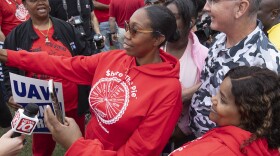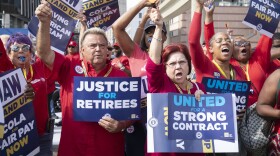
Camila Domonoske
Camila Flamiano Domonoske covers cars, energy and the future of mobility for NPR's Business Desk.
She got her start at NPR with the Arts Desk, where she edited poetry reviews, wrote and produced stories about books and culture, edited four different series of book recommendation essays, and helped conceive and create NPR's first-ever Book Concierge.
With NPR's Digital News team, she edited, produced, and wrote news and feature coverage on everything from the war in Gaza to the world's coldest city. She also curated the NPR home page, ran NPR's social media accounts, and coordinated coverage between the web and the radio. For NPR's Code Switch team, she has written on language, poetry and race. For NPR's Two-Way Blog/News Desk, she covered breaking news on all topics.
As a breaking news reporter, Camila appeared live on-air for Member stations, NPR's national shows, and other radio and TV outlets. She's written for the web about police violence, deportations and immigration court, history and archaeology, global family planning funding, walrus haul-outs, the theology of hell, international approaches to climate change, the shifting symbolism of Pepe the Frog, the mechanics of pooping in space, and cats ... as well as a wide range of other topics.
She was a regular host of NPR's daily update on Facebook Live, "Newstime" and co-created NPR's live headline contest, "Head to Head," with Colin Dwyer.
Every now and again, she still slips some poetry into the news.
Camila graduated from Davidson College in North Carolina.
-
GM employees at the Fairfax plant in Kansas City, Kansas, narrowly voted to approve the contract with just 52% in favor, while the majority of workers at the Wentzville, Missouri, plant rejected the deal. Long-time workers should see pay rise by about 33%, while some newer workers and temps will see their pay more than double.
-
General Motors had previously warned it would need to stop production at its Fairfax, Kansas, assembly plant, because it relied on parts that came from a Missouri plant that is currently on strike.
-
Why did Southwest cancel so many flights, and what's next for affected travelers? The airline-in-crisis hasn't answered all the questions, but claims it has returned to normal operations.
-
The ventilators will be delivered to the national stockpile by August. The contract, worth nearly $500 million, is the first ventilator order placed using the Defense Production Act.
-
Medical device manufacturers are asking the Trump administration to centralize decisions about how to prioritize which orders from states, local governments and hospitals should be filled first.
-
Marathon video chats led to a record-setting 9.7 million barrels per day in cuts. But analysts say that's not a big enough drop to balance oil markets, given the total collapse in demand for crude.
-
Medical technology companies — sometimes working with carmakers — have been massively increasing production of ventilators. For two weeks, they've been working without government contracts in hand.
-
Auto assembly plants across the country continue to be closed amid the coronavirus pandemic. Tens of thousands of workers are going without pay.
-
More countries are imposing export restrictions on essential medical materials, to try to keep domestically produced goods — like masks, gloves and ventilators — available for domestic needs.
-
The pandemic is keeping cars parked, which means fewer crashes — and big savings for auto insurers. Allstate, American Family Insurance and Geico have decided to return that extra cash to customers.










